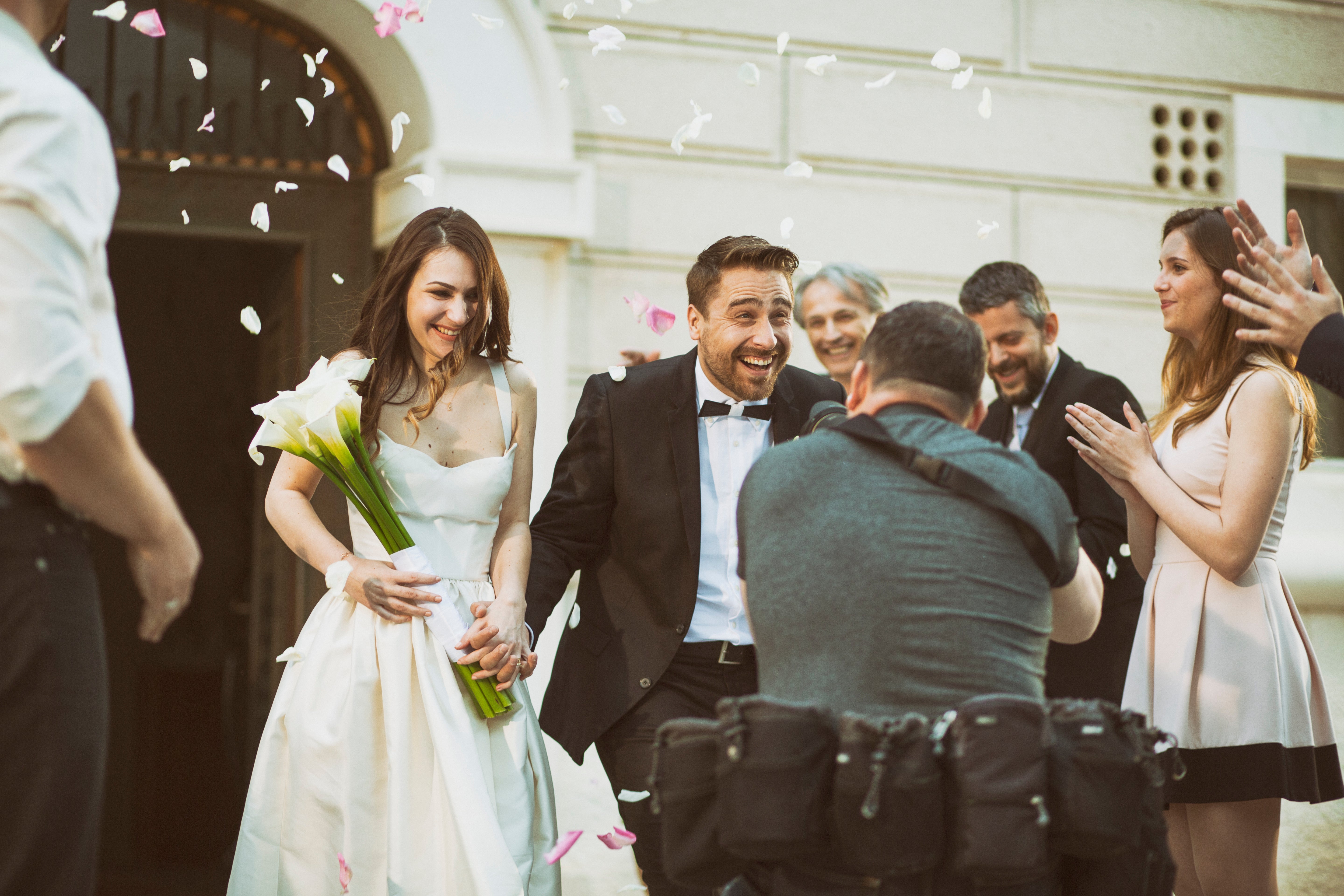The toxic war between wedding photographers and vicars: ‘Some are rude, humiliating, aggressive and abusive’
As a petition calls for improved conditions between the clergy and the photographers and videographers working in their churches, Katie Rosseinsky speaks to people on the frontlines who’ve seen the happiest days of couples’ lives turn into volatile showdowns


Your support helps us to tell the story
From reproductive rights to climate change to Big Tech, The Independent is on the ground when the story is developing. Whether it's investigating the financials of Elon Musk's pro-Trump PAC or producing our latest documentary, 'The A Word', which shines a light on the American women fighting for reproductive rights, we know how important it is to parse out the facts from the messaging.
At such a critical moment in US history, we need reporters on the ground. Your donation allows us to keep sending journalists to speak to both sides of the story.
The Independent is trusted by Americans across the entire political spectrum. And unlike many other quality news outlets, we choose not to lock Americans out of our reporting and analysis with paywalls. We believe quality journalism should be available to everyone, paid for by those who can afford it.
Your support makes all the difference.I was just totally aghast: you wouldn’t expect to be spoken to like that by another wedding supplier, let alone a person of the cloth.” Kathryn Fell has been photographing weddings for more than a decade, and can clearly remember her first run-in with a recalcitrant vicar. “I was told that I couldn’t stand by the front of the church, where the bride and groom had assumed that I could, so I couldn’t photograph any of the ceremony – I had to stand at the back. And the vicar was very gruff, very rude, and just said, ‘do as I say, don’t do this, don’t do that’, without even trying to start off things on a good foot.”
Her experience isn’t anomalous. Wedding day friction between snappers and the clergy has boiled over recently, after more than 900 people signed a change.org petition calling to improve conditions for photographers and videographers working in churches. Its creator, Rachel Roberts, claimed some vicars “are not only hindering professional video/photographers from doing the job they’ve been paid to do, they’re more often than not rude, humiliating, aggressive and abusive”; as evidence, she cited a TikTok clip which showed a priest shouting at a photographer before a ceremony. Even Rowan Williams, the former Archbishop of Canterbury, has weighed in on the row: he conceded that “some vicars can be a complete pain and over-controlling to a degree”, but also noted that “clergy too need to be able to do their jobs”.
The photographers tend to tell a similar story: heading over to church from the bride’s house, only to be greeted by “a barrage of rude and unpleasant [interactions]” with the vicar, as Jennifer Jane Shoubridge of Jennifer Jane Photography puts it. This is often minutes before the ceremony, with little time for negotiation, “and it is a bit of a shock because you don’t really expect it from the Church, who preach kindness, forgiveness, respect”, Shoubridge says. “I understand that in the past, there may well have been individuals that didn’t respect the building, and that’s how some of these attitudes have come about. Sometimes it feels a little bit like you’re being punished for the sins of the father.”
Photographer Ben Bardsley-Ball, meanwhile, says that at the start of his career, he “was made to feel as if [I] was intruding by being there [in church]”. During a wedding,he says, all the various suppliers involved in the event tend to work happily in unison, “and the only time I’ve ever really found that’s not been reciprocated is usually with church weddings”.
When those initial moments before the bride’s arrival get fraught, wedding planner Lavinia Stewart-Brown says she has often had to act as a “middleman”, negotiating “when the bride’s car is about to pull up and the vicar has gone ‘you can’t shoot in there’”. She’s seen photographers left standing at the back of the church, “behind this pillar, a floral arrangement in [their] face” – none of which is particularly conducive to capturing the bride coming down the aisle, or the couple’s first kiss. But, she notes, “both sides have their own point – obviously the photographers are working for the couples, but then with the vicar or priest, [the church] is their home, isn’t it? And that needs to be respected”.
It’s a perfect storm of conflicting priorities. Photographers, says Shoubridge, “just want to capture the moment for our couples”. Many of these couples will have spent months, even years, and many, many thousands of pounds (thank you, wedding industrial complex), on painstakingly planning their “big day”; no wonder they want to record every moment for posterity (and for Instagram). “It can be really sad when, as a photographer, you’re not always able to give them the images they want to get,” Shoubridge adds.

But saying your vows in a church is also about, well, God – and often clergy are worried that the click-click of a lens detracts from the solemnity of this special moment. “The concerns are [about] distractions and disruptions during the service,” says Father Lee Taylor, the vicar of three picturesque parishes around Llangollen, North Wales; his churches are all situated in an Area of Outstanding Natural Beauty, making them pretty popular with soon-to-be-weds. “The use of a flash, the noise of the shutter of the lens going off and on all the time, constant movements around the church – a lot of us find it disrespectful.” Clergy, he says, have “got to prioritise the solemn and reverent side of the matrimonial vows. We’re really mindful that it’s an act of divine worship. It’s a wedding, it’s a celebration, but it’s also in the context of something sacred and holy”.
The photographers I speak to are keen to stress one thing: it’s not all vicars. They’ve all had great experiences shooting church weddings. “It’s not about church bashing, or reverend bashing”, Shoubridge says, “because 95 per cent of my interactions with the Church have been lovely and super-accommodating. That’s not to say that I’ve had free rein of every church I’ve gone to… but I’ve been treated very nicely.”
But the unpleasant interactions do tend to be pretty memorable – there aren’t many other professions where you’d expect to turn up to do your work, then be told to go and stand in a corner, treated like a naughty child. Another factor making things more confusing, Shoubridge adds, is the unpredictability. “You can go to one church one weekend, and the vicar will say to you, ‘be discreet but I’m happy for you to move around and get whatever [shots] you need’. Brilliant.
“But you can go to that same church the next weekend and be plonked at the back and told you can have one photo as [the bride] comes in and one photo as she goes out.” It all depends on their personal preference. “It would be really helpful”, she argues, “just to have some sort of guidelines, so everybody knows where they are. There’s nothing at the moment – if you go on the Church of England’s website, there’s nothing for videographers and photographers working within the church.”
It’s a wedding, it’s a celebration, but it’s also in the context of something sacred and holy
During his 12 years as a vicar, Fr Taylor admits that he has had a few run-ins with photographers, but he has “mellowed out” over time, growing to understand that “this issue is rooted in different priorities and expectations”. He’s since “toned down” his church’s policies: “In the beginning, I was very much like, ‘no flash photography, no moving about’. A lot of the clergy is still quite strict on that – some of my colleagues are not budging on it. But it’s about trying to find a balance, isn’t it? Of what the couple wants and what the Church expects.”
In order to try and reduce the potential for wedding day drama, he’s written some guidelines for couples preparing to get married in his churches – which includes a stipulation that the photographer needs to speak to him beforehand. “That’s an essential thing that I insist on. I’ve allowed flash but only for the bride’s entrance, the signing of the register and the exit at the end. And to be honest, they’re quite happy with that. They’re like, ‘you’re much more flexible than a lot of churches’ … I know some of my colleagues don’t brief photographers, then they turn up [on the day] and the clergy gets cross, and the photographers think ‘I’m not doing my job’.”
Many photographers do try to reach out to the church beforehand, too (although it’s hard to meet in person during the busy summer wedding season), and urge their clients to have a proper conversation about pictures with whoever’s in charge of their ceremony. “It’s really important to say to the vicar that you would like photographs during the ceremony and get that signed off first,” says Kathryn Fell. “So many times [couples] assume that’s the case and you get to the rehearsal and the [vicar] goes, ‘no, I’m not having them stand there!’ and takes it out on the photographer.”
For Shoubridge, the photographers’ petition isn’t about trying to stir up division or make a fuss. “We’re just trying to say that there must be a way where we can both work together in a mutually respectful way”, she says, “so that we can both get the couple what they want.” And Fr Taylor reckons that ironing out this issue is in the Church’s interest too, to ensure that couples keep opting for religious ceremonies (between 1999 and 2019, the number of Church of England marriages in England and Wales dropped by half).
“I think it behooves all the clergy and all the priests to really think about this from a missional point of view,” he says. “It affects your outreach to people, how you come across to younger couples and how people view the church as well.” Plus, he notes, even churches need some good material for Instagram. “We share [wedding] photographs, and it does [photographers] some good and does the Church good – because the church looks really splendid.”
Join our commenting forum
Join thought-provoking conversations, follow other Independent readers and see their replies
Comments